|
Welcome John! Thanks for taking some time to chat about writing. First, a few quick-fire questions: What is your favourite book series of all time? Do you prefer a pen or a pencil? And (most contentiously), what is your favourite bookshop in Vancouver? Josh, thanks so much for making time for me. I always love to chat about writing, and in that vein, congratulations on your recent launch of "The Gatewatch." I wish you all the success in the world. Okay, now to your questions--OMG, quick-fire? Really? In my mind, all three of these are contentious and deserve exploration to do them justice. First up--my favourite book series of all time. Like I suspect is the case with many readers, mine's changed over time (either that or I'm hopelessly fickle, which is also a distinct possibility). When I was about sixteen, I liked The Belgariad by David Eddings. It was the first modern fantasy series I encountered after reading The Chronicles of Narnia and The Lord of the Rings, and it led to me falling in love with the genre. In my twenties, my favourite became The Warlord Chronicles by Bernard Cornwell. My first introduction to the Arthurian Cycle came through the original Welsh legends and I've always been dubious/snobbish/a bit of a jerk when it comes to the character of Lancelot. The way the character was presented to me showed him as a twelfth-century addition, with the intent of promoting the tenets of courtly love (I was also told he usurped Gawain's place in the legends, whom I've always liked). "In Cornwell's series, he treats Lancelot with the same disdain I've always felt for the character, and it made me cheer to see someone else with the same prejudice against a fictional character created eight hundred and fifty years ago." In Cornwell's series, he treats Lancelot with the same disdain I've always felt for the character, and it made me cheer to see someone else with the same prejudice against a fictional character created eight hundred and fifty years ago. Today--after much deliberation (as I've read many good series and had a difficult time picking just one)--I'll say my current favourite is The Gentleman Bastards by Scott Lynch. Lynch's series (which isn't complete yet) is a fun rogue's story that has me eagerly awaiting it's next installment. Now, to weigh in on the pen versus pencil debate--well, it depends on what I'm writing. If it's quick notes to myself, I prefer the pencil and notepad I keep on my desk. If it's writing something requiring more longevity--like a grocery wish list, or the draft of a story I'm writing, or critiquing a student's work--I prefer pen. However, I will point out my handwriting is absolute crap in any case (I failed penmanship in public school for as long as they gave marks for it), so if I want someone else to actually read what I've written, I've got to concentrate very hard. In all honesty, I prefer a computer (I can usually type much faster than write with either a pen or a pencil), with legibility being a very welcome by-product). "In all honesty, I prefer a computer (I can usually type much faster than write with either a pen or a pencil), with legibility being a very welcome by-product)." And finally, my favourite bookshop in Vancouver...um, well, it's actually in Chilliwack. I live in North Vancouver and with bridge traffic being what it's become the past few years, I find going overtown has become a major pain in the ass I prefer to avoid. However, I really like going to bookstores so for me to cross Burrard Inlet, the destination has to be worth it. I first came across The Book Man several years ago and quite frankly, it's one of the few used book stores I've been to which is completely catalogued (and fully integrated with their Abbotsford location), is laid out neatly, and doesn't smell like musty pages. Their selection is wide and I've had a trading account with them for years (wherein I give them books I know I won't read again for credit against the new-to-me books I bring home). Every now and then my wife and I make a day trip out to Chilliwack for lunch and bring back a book haul to add to our seemingly-never-depleting TBR piles. Describe your writing practice. Do you have a specific space that you write or do you like to write in different places? Do you like white noise, music, or silence? Do you have a schedule or do you write as inspiration strikes? I'm lucky to have an office within stumbling distance of my bedroom (it's just down the hall on the far side of the bathroom), complete with a whiteboard on one wall, a corkboard on another, a map of my fantasy world on a third, a shelf of reference books, and an old dining table for a desk. Occasionally, I set up a tarp and drag my laptop (along with our main dining table) out on our patio, but I usually only do that on the hottest of summer days. "I'm lucky to have an office within stumbling distance of my bedroom (it's just down the hall on the far side of the bathroom), complete with a whiteboard on one wall, a corkboard on another, a map of my fantasy world on a third, a shelf of reference books, and an old dining table for a desk." As for background noise, I generally prefer silence, but sometimes will use ambient sounds to create a specific mood (like waves on a pebble beach or a forest at night or the sounds of a fantasy tavern--whatever I think the scene I'm writing requires). When I'm not looking for auditory inspiration, I've got a set of industrial-strength protective ear muffs I wear to ignore the intermittent sounds I find so plaguingly-distracting such as leaf blowers, basketballs, back-up beepers, garbage and recycling trucks, exuberant children, and neighbours with large voices. As to a schedule, I generally write Monday to Friday, from when I wake up until mid-afternoon (when I drag my butt outside and go for an hour-long hike to offset the damage my many hours of continuous sitting do to me). You’ve taught Creative Writing at many places: Capilano University, Simon Fraser University, and the University of British Columbia to name a few. What has teaching creative writing brought to your own practice as a writer? Humility. As luck/fate would have it, the very first student paper I had to grade was submitted by a student who I recognized immediately was a far better writer than I was. Yes, I had a rubric to help guide me, and yes, this writer ticked all the boxes for what the assignment called for, but outside of that, the evident passion, precise clarity, and emotional depth with which that manuscript was written just blew me away. And the fact that I can still remember that story today speaks volumes in my mind. "...the evident passion, precise clarity, and emotional depth with which that manuscript was written just blew me away. And the fact that I can still remember that story today speaks volumes in my mind." Respect. While I was taking courses on how to specifically teach creative writing, I met a professor who shared some advice I've never forgotten (to paraphrase): Always be respectful when critiquing a student's (or anyone's) work. Writing is often very close to people's hearts and it can take great courage to share. As a teacher, I have the power to cause a student to never write again if I choose to say something flippant or hurtful (which I try never to do). The way I understand it, people typically study subjects in order to improve, so I try to be as supportive as I can, while also being encouraging, honest, and (hopefully) helpful. And finally, for my own practice of putting words on paper, the biggest lesson I've learned from my students comes as a result of both humility and respect: taking comfort in the fact I'm not alone, unique, or even as big a blockhead as I sometimes think I am. Most of the writing problems, insecurities, and other challenges I encounter, I've seen my students face (and usually solve) many times over. It's very comforting to know that writing--even though it's an inherently solitary act--can be a shared communal experience (and that's even before what happens when readers get a hold of your stuff). "It's very comforting to know that writing--even though it's an inherently solitary act--can be a shared communal experience (and that's even before what happens when readers get a hold of your stuff)." Speculative fiction is an umbrella term for a diverse array of writing genres, including sci-fi, fantasy, horror, alternate history, apocalyptic, superhero and supernatural fiction. All typically involve worlds unlike our own. What is it that draws you to speculative fiction as a writer? And are there any specific genres that you feel suit your writing style particularly well or do you like to experiment across multiple genres? What draws me to speculative fiction as a writer? It's simple--I want to write what I like to read. Ever since I finished reading C.S. Lewis's The Horse and His Boy (I think I was seven or eight at the time), I knew I wanted more stories like that one, stories filled with adventure, danger, excitement, fear, fun, and wonder. Stories set on different worlds where people lived lives different from my own, according to a different set of rules. Oh yeah, and magic--I've always thought that was pretty cool. And mystical creatures, too. And swords. Yeah, I like swords. "Oh yeah, and magic--I've always thought that was pretty cool. And mystical creatures, too. And swords. Yeah, I like swords."
You’ve got a new story about a werewolf stuck in a halfway house with vampires coming out in Speculative North. I’ve noticed a bit of a resurgence of interest in monster fiction online (vampires specifically) and I want to know, what do you think keeps drawing people back to stories about werewolves and vampires? What is it about these creatures that fascinates us so deeply? To be honest, I really don't know why these creatures have such a grip on the Western imagination. Maybe it's cultural familiarity, maybe it's a collective thrill, maybe it's the security of a fear people can understand the rules of (thereby making it conquerable). I once heard Margaret Atwood link the popularity of monster stories to contemporary fears about disease--lycanthropy to rabies, vampirism to tuberculosis, and zombism to Alzheimer's. "I once heard Margaret Atwood link the popularity of monster stories to contemporary fears about disease--lycanthropy to rabies, vampirism to tuberculosis, and zombism to Alzheimer's."
Ulrica (my werewolf) is placed in the unfair, untenable, and completely unreasonable position of trying to keep her shit together while contending with increasing provocations from sources which have no regard for her as a person whatsoever (in part, the vampires). Aside from being fun to write, the ending was also very cathartic for me. One of the things I feel that newer writers really struggle with is conveying emotion. Typically, I find that they err on the side of overwriting emotion to the point that their descriptions become either redundant or hyperbolized. What advice can you offer these writers about writing emotion well? If you're a writer struggling to convey emotion, here's my advice: relax and don't worry about being redundant or hyperbolizing... whatever you write in a first draft--you'll fix in revision. For me, the purpose of a first draft is solely for getting a story down on paper (or on the computer--or, well, anywhere, really, just as long as it's no longer just in your head). A first draft is not for sharing; it's for giving you something to work with. If you find you've gone too far in trying to convey emotion, simply pull it back in subsequent drafts (yeah, drafts is plural). If you find you've cut too much, simply add more until you find the right balance. I honestly believe no manuscript written by no author ever (whether new or veteran), can't help but be improved with revision. Rather than let this scare you, take comfort in the opportunity to fix everything and anything before you share it with a reader. "A first draft is not for sharing; it's for giving you something to work with. If you find you've gone too far in trying to convey emotion, simply pull it back in subsequent drafts (yeah, drafts is plural)." Now, if you've revised your manuscript as much as you can and still aren't convinced you've successfully conveyed the emotion you want to, my suggestion is this (and OMG, it is so not original advice)--show, don't tell. For a quick example, rather than tell your reader that Director Chalmers, the Overseer of the Principal Europan Water Collection Plant is the angriest she's ever been in her life at Technician MacNulty's stupidity for letting the sewage outflow pass through the potable water intake filters, show how pissed she is by having her punch (and crack) the only glass window in the air-tight facility; or by having her physically pick up MacNulty and throw him into the sewage tanks (although I understand Europa's gravity is only about 13% of Earth's, so this might not be such a remarkable feat); or, have her grit her teeth so hard she draws blood or chips a tooth, or, call him a list of four-letter names three paragraphs long (never once repeating herself), or you could even do something as subtle as have her shake her head, lower her voice to a whisper, and tell MacNulty to return to his quarters (which, given Director Chalmer's possible past behaviour, might be the most menacing response of all). "...or you could even do something as subtle as have her shake her head, lower her voice to a whisper, and tell MacNulty to return to his quarters (which, given Director Chalmer's possible past behaviour, might be the most menacing response of all)." In any case, I hope you get the idea. It's in specific details and actions where the more enduring fictional impressions are created and by showing your readers how angry Director Chalmers is, they'll infer (usually, very quickly) what you want them to understand, with the side effect that any connection the reader makes (as in Director Chalmer's behaviour betraying her emotional state), will have much more impact than simply telling your reader the information, and should avoid the tendency toward redundancy or hyperbole. Can you give us any hints or clues about what your next project is? Any sneak-peek quotes or teasers? I'd be happy to give you a tiny sneak-peek, but I will preface it by warning what I'm about to share may not end up in the final version of the story. I'm currently working on a dark fantasy trilogy (tentatively called "The Unhallowed"), and (at the moment) I'm planning on opening book one with an excerpt from its epilogue (the idea being to give readers a sense of where the story is going, and to let them know which characters they should pay attention to). Oh, and I think it's only fair to say this story could easily be classified as grimdark, so expect something a little twisted and morally questionable. Here goes: Where can readers find the current issue of Speculative North and how can they keep track of your future publications? Speculative North is available for purchase on Amazon, and I'm also told an electronic version will be free from the publisher for a short time after that. As for keeping track of my future publications... I've got a website which should have all the information anyone could possibly want, a very infrequent newsletter (which you can sign up for on my website), a Facebook page, and I'm pretty consistent about putting things up on Goodreads, too. Read John Mavin's short story "Restraint" and more amazing Canadian short fiction in the TDOTSPEC publication Speculative North!
1 Comment
|
AuthorJoshua Gillingham is an author, editor, and game designer from Vancouver Island, Canada. Archives
April 2022
Categories
All
|

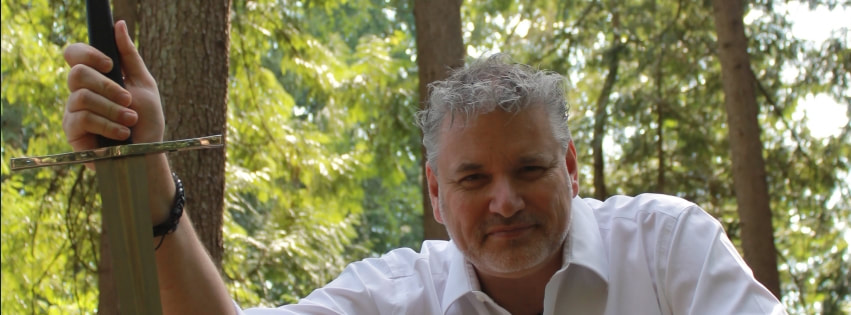

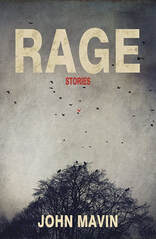
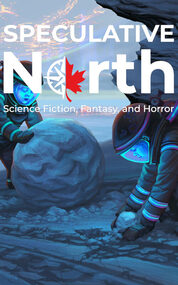

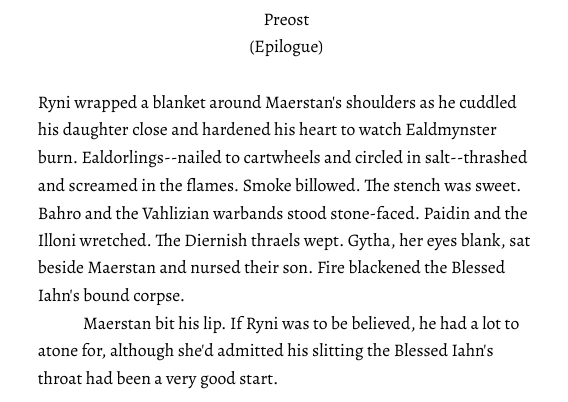
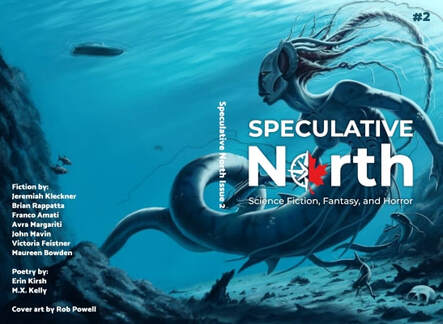
 RSS Feed
RSS Feed
